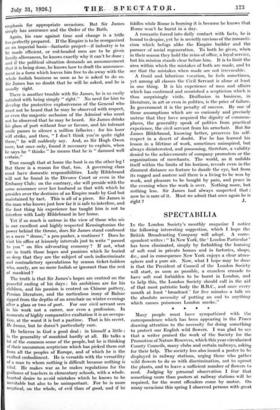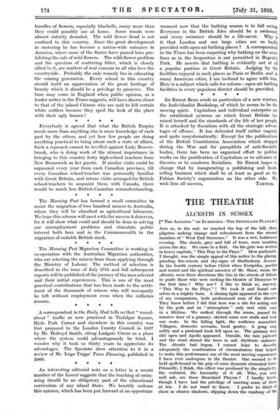. SPECTABILIA
IN the London Society's monthly magazine I notice the following interesting suggestion, which I hope the British Broadcasting Company will adopt. A corre- spondent writes : " In New York, the London Particular' has been eliminated, simply by forbidding the burning of soft coal in private houses and in factories, shops, &c., and in consequence New York enjoys a clear atmo- sphere and a pure air. Now, what I hope may be done is that the President of Council of the London Society will start, as soon as possible, a ceaseless crusade to have soft coal forbidden to be burnt in London, and to help this, the London Society should call in the aid of th,at most patriotic body the B.B.C., and once every month at _least broadcast'' for five minutes a talk on the absolute necessity of putting an end to anything which causes poisonous London smoke."
• •
Many people must have sympathized with the correspondence which has been appearing in the Times drawing attention to the necessity for doing something to protect our English wild flowers. I was glad to see that a writer praised the work of the Society for the Promotion of Nature Reserves, which this year circularized County Councils, many clubs and certain railways, asking for their help. The society has also issued a poster to be displayed in railway stations, urging those who gather wild flowers to do so with discrimination, not to uproot the plants, and to leave a sufficient number of flowers to seed. Judging by personal observation I fear that something more than posters at railway stations will be required, for the worst offenders come by motor. On Many occasions' this spring I observed persons with great bundles of flowers, especially bluebells, many more than they could possibly use at home. Some woods were almost entirely denuded. The wild flower fiend is not confined to this country. Since the great development in motoring he has become a nation-wide nuisance in America, where some of the States have passed laws pro- hibiting the sale of wild flowers. The wild-flower problem and the question of scattering litter, which is closely allied to it, are matters of real concern to all who love the countryside. Probably the only remedy lies in educating the coming generation. Every school in this country should instil an appreciation of the great heritage of beauty which it should be a privilege to preserve. The time may come in England when public opinion, as a leader writer in the Times suggests, will have drawn closer to that of the inland Chinese who are said to kill certain white settlers because they spoil the look of the place with their ugly houses !
* * * * Everybody is agreed that what the British Empire needs more than anything else is more knowledge of each part by the others, and yet how few people are doing anything practical to bring about such a state of affairs. Such a reproach cannot be levelled against Lady Beaver- brook, who is doing work of the utmost importance in bringing to this country forty high-school teachers from New Brunswick as her guests. If similar visits could be organized every year from each Canadian province, till every Canadian school-teacher was personally familiar with Great Britain, and return visits arranged for British school-teachers to acquaint them with Canada, there would be much less British-Canadian misunderstanding.
* * * * The Morning Post has formed a small committee to assist the migration of two hundred miners to Australia, where they will be absorbed as agricultural labourers. We hope this scheme will meet with the success it deserves, for it will show what could and should be done in solving our unemployment problems and stimulate public interest both here and in the Commonwealth in the migration of suitable British stock.
* * * * The Morning Post Migration Committee is working in co-operation with the Australian Migration authorities, who are selecting the miners from those applying through the Ministry of Labour. The method of selection is described in the issue of July 27th and full subsequent reports will be published of the journey of the men selected and their initial experiences. This is one of the most practical contributions that has been made to the settle- ment of the thousands of miners who will necessarily be left without employment even when the collieries resume.
A correspondent in the Daily Mail tells us that " round- about" traffic as now practised in Trafalgar Square, Hyde Park Corner and elsewhere in this country was first proposed to the London County Council in 1897 by Mr. Hoiroyd Smith, citing Ludgate Circus as a place .where the system could advantageously be tried. I wonder why it took us thirty years to appreciate its advantages. The Spectator drew attention to it in a review of Mr. Inigo Triggs' Town Planning, published in 1909.
• * *
An interesting editorial note on a letter in a recent number of the Lancet suggests that the teaching of swim- ming should be an obligatory part of the educational curriculum of any island State. We heartily endorse this opinion, which has been put forward at an opportune moment now that the bathing season is in full swing, Everyone in the British Isles should be a swimmer, and every swimmer should be a life-saver. Why is it that. London and our large cities are so badly provided with open-air bathing places ? A correspondent in the Times has been enquiring why bathing on the same lines as in the Serpentine is not permitted in Regent's Park. He asserts that bathing is evidently not at all a popular pastime in Great Britain. Judging by the facilities enjoyed in such places as Paris or Berlin and in many American cities, I am inclined to agree with him. Here is a subject which calls for reform-=open-air bathing facilities in every populous district should be provided.
* * * Sir Ernest Benn sends us particulars of a new venture, the Individualist Bookshop, of which he seems to be the moving spirit. Capitalism and individual enterprise are the established systems on which Great Britain has. raised herself and the standards of the life of her people, It is attacked by Socialism with all the strategic advan- tages of offence. It has defended itself rather vaguely and quite unsystematically. Except for the publications of the British Constitution Association which stopped during the War and for pamphlets of anti-Socialist bodies, there has been no organized effort to publish works on the justification of Capitalism or to advance its theories or to condemn Socialism. Sir Ernest hopes to change that by inaugurating a publishing and book. selling business which shall be at least as good as the Fabian Society's organization on the other side. We



































 Previous page
Previous page